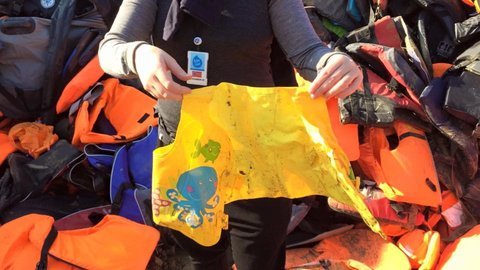
The "life vest graveyard" on the Greek island of Lesbos is piled high with tens of thousands of life vests discarded by refugees, many Syrian but also Iraqis, Afghanis, and other nationalities, after their treacherous journey across the sea from Turkey.
Many of these vests are not capable of saving a life, and don't. Traffickers have sold life vests filled with straw and children's "life" vests -- intended for supervised play in kiddie pools and clearly imprinted with warnings that they are not life-saving devices.
Lesbos, where I spent winter break as a volunteer, received thousands of refugees a day for many months. While daily numbers are now closer to 1,000, because the winter weather is bad, the problem looms larger.
To many Americans, the European refugee crisis seems far from home. We have our own problems, and some among us have prejudices and fears that prevent feeling any connection to the countless individuals who have left everything behind, transporting themselves and their families -- including infant children and elderly grandparents -- to a safer life.
"We are them, and they are us. And it is that connection that became so obvious to me, even in my short time on Lesbos."
Before war and violence tore their world apart, many once had lives much like our own. They lived, worked, and enjoyed a level of comfort just as we do. The conditions they suffer create the same emotional responses they would for us if we were put into a similar situation through an unfortunate mix of complex events. What separates our situation from theirs? We are them, and they are us. And it is that connection that became so obvious to me, even in my short time on Lesbos.
I started each day before dawn with other volunteers, scanning the horizon for refugee boats, prepared to bring frightened passengers safely to shore and provide them with dry clothes and human comfort. The sub-standard rafts were typically overloaded, often transporting 25 people on a raft meant for eight.
On land, conditions remained bleak. At the Moria refugee camp, a former prison near Mytilene, the capital of Lesbos, we managed to fit nearly 800 refugees into accommodation blocks built for 200-250. The compound is meant for vulnerable people -- families with small children, single women, the elderly, sick, or disabled.
My first night, more than 500 refugees arrived from the beaches, most between 2:00 and 6:00 a.m. We spent the entire night running, trying to squeeze more people into already full rooms, and seeing their despair when we told them they had no choice but to sleep on the hard floor with strangers. We provided as many blankets as possible as well as water, a snack, diapers and bottles of formula for the babies, and dry clothes if theirs were wet.
When I arrived for the 1 a.m. shift the following night, the compound was full with over 700 new people. This meant chaos for the early morning wake up calls -- to move exhausted people out of the compound to wait in line, in 30-degree temperatures, to begin the government's registration process. Some still wore damp or otherwise inadequate clothing.
It's difficult to tell a mother and her children that you can't give them dry shoes or clothes, simply because we have to use resources carefully, since hundreds of people come through the gates each night. Trying to communicate this is extremely difficult when we lack a common language; the message that gets across is simply, "no."
The disillusioned look on the faces of people who could be doctors, lawyers or other professionals as we showed them to crowded, smelly rooms with only bits of open floor space was heartbreaking. The frightened faces of small children who have no idea what is happening to them compounds the complete loss of innocence brought by the horrific journey.
From Turkish smugglers who charge up to 2,000 euros per person and overload rafts at gunpoint, to long waits in freezing cold, to crowded stays in a compound bounded with chain link fence and razor wire, these people have endured much on this journey to a safer life. Still, they are very much like us.
Upon returning to my studies on campus, I find myself at a loss for words, unable to accurately describe what is going on in the region I just left. But the fact is, we all need to do better to help each other.
Understanding their plight and accepting that these refugees need and deserve our help is a good start. Offering a donation to volunteer groups and organizations that help these refugees, or crowd-funding an independent volunteer, can make a world of difference in essentially preserving human dignity. But even more so, stopping harmful rhetoric about who refugees are or are not is something that we all can do, because they are truly just people desperately seeking peace and safety.
The kindness I witnessed amid the chaos restores some of my faith in humanity. Where there is pain, I pray there is also healing.
Amelia Karayianis is a senior majoring in Global Citizenship at Becker College in Worcester, Mass.
